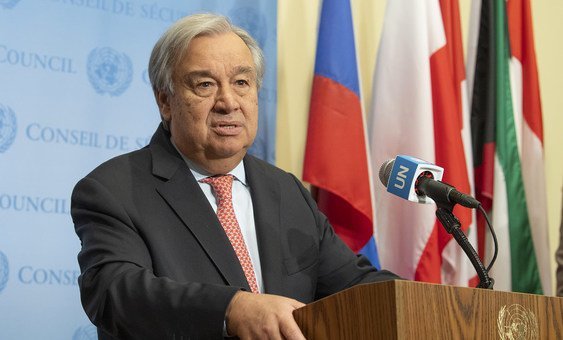“The Secretary-General condemns the continued loss of life in Gaza, including women and children, as we witness yet another devastating strike by Israel on the Al-Taba’een school in Gaza City, sheltering hundreds of displaced Palestinians families, with scores of fatalities, amidst continued horror, displacement, and suffering in Gaza,” said UN Deputy Spokesperson Farhan Haq.
The incident occurred on Saturday and at least 100 people were killed, according to international media reports, which cited the Gaza health authorities.
Local hospital ‘overwhelmed’
At the time of the attack, people were performing the dawn prayer at the school’s prayer hall.
Casualties were brought to Al Ahli hospital – among the 16 hospitals that remain only partially functional in the Gaza Strip – which is “overwhelmed by this mass casualty incident amid shortages of medications, clean water and beds,” Mr. Haq told journalists.
Humanitarian partners on the ground helped families who returned to the school, providing drinking water, food parcels, hot meals, hygiene kits and clothing, as well as psychological first aid and psychosocial support activities for children and their parents.
According to the UN human rights office, OHCHR, this is at least the 21st strike on a school, each serving as a shelter, since 4 July, which have resulted in at least 274 fatalities, including women and children.
Implement resolution on ceasefire deal
Mr. Haq said the Secretary-General was dismayed to see that provisions of UN Security Council resolution 2735 (2024) remain unimplemented.
Adopted in June, the resolution proposes a comprehensive three-phase ceasefire deal between Hamas and Israel to end the war in Gaza, now in its 10th month.
The first phase would include an immediate, full and complete ceasefire with the release of hostages; the return of the remains of some hostages who have been killed, the exchange of Palestinian prisoners, withdrawal of Israeli forces from populated areas in Gaza, the return of Palestinian civilians to their homes, and the safe and effective distribution of humanitarian assistance at scale throughout the enclave.
The second phase calls for a permanent end to hostilities in exchange for the release of all other hostages in Gaza and a full withdrawal of Israeli forces from the area, while phase three would see the start of a major multi-year reconstruction plan for Gaza and the returns of the remains of any deceased hostages still there to their families.
Mediation efforts welcomed
Mr. Haq said the UN chief welcomes the mediation efforts of the United States, Egypt, and Qatar leaders, and urges both sides to rejoin negotiations and conclude the ceasefire and hostages release deal.
Mr. Guterres reiterated his urgent appeal for an immediate ceasefire and the unconditional release of all hostages, while again underscoring the need to ensure both the protection of civilians and unimpeded and safe humanitarian access into and across Gaza.
“The Secretary-General underlines that international humanitarian law, including the principles of distinction, proportionality, and precautions in attack, must be upheld at all times,” he concluded.
Re-commit to the ‘Rules of War’: UNRWA chief
Separately, the head of the UN Palestine refugee agency, UNRWA, upheld the need to protect civilians, civilian infrastructure, detainees and humanitarians amid armed conflict.
Writing on the social media platform X, UNRWA Commissioner-General Philippe Lazzarini recalled that Monday marked 75 years since the Geneva Conventions – “the universal ‘Rules of War’” – were put in place to protect civilians caught in the crosshairs.
Mr. Lazzarini said the Geneva Conventions are “the one set of rules we ‘all agree on’”, though he questioned if that indeed were the case.
“In the past 10 months, these rules have been blatantly broken day in, day out in Gaza by the Israeli Forces as well as the Palestinian armed groups including Hamas,” he said.
“More concerning, Member States – party to the Geneva Conventions – have failed in their responsibilities to respect the conventions and ensure that parties to the conflict respect them under all circumstances.”
Legal compass
Mr. Lazzarini warned that “our shared values enshrined in the Conventions are at stake as is our shared humanity.”
He stressed that it is time to re-instate those values and re-commit to the Geneva Conventions.
“They are the compass of international humanitarian law,” he said. “The basics still apply: Civilians, women, children, detainees must be protected. Schools, hospitals, people’s homes, humanitarian and UN staff, facilities and operations must be protected.”
Find out more about the Geneva Conventions in our explainer outlining what international humanitarian law is and why it matters.

